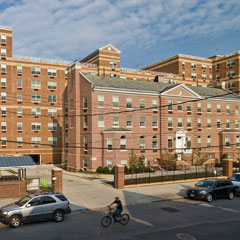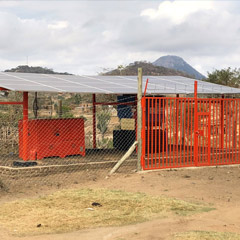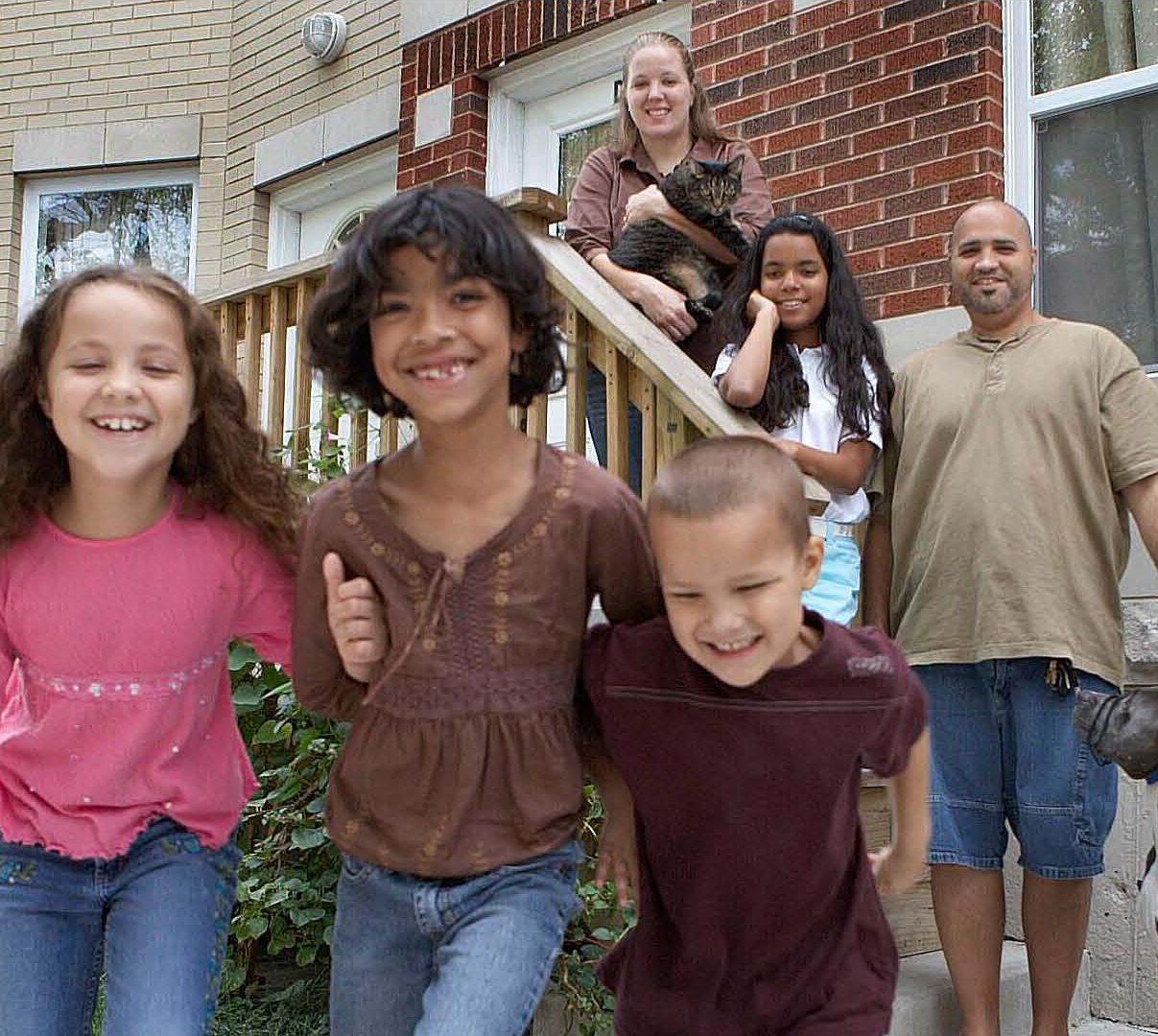What is Catalytic Capital?
Catalytic capital is defined as debt, equity, guarantees, and other investments that accept disproportionate risk and/or concessionary returns relative to a conventional investment in order to generate positive impact and enable third-party investment that otherwise would not be possible. Below are examples of projects that have received support through catalytic capital.
Catalytic Capital at Work (PDF) ›
New York City Housing Acquisition Fund

Financing More Than 12,000 Affordable Apartments
To acquire and preserve high-quality rental housing for low- and moderate-income residents, local developers need access to large and flexible acquisition and pre-development loans at terms not typically available from the commercial market. The NYC Housing Acquisition Fund was created in 2006 to address that need, offering bridge financing to affordable housing developers.
The Fund was launched with first-loss capital from its lead housing agency, and subordinated, low-cost debt from six foundations—which laid the groundwork for senior loans from 16 financial institutions. By blending funds from these sources of capital, the Fund can take on greater risk and offer patient repayment terms tailored to project needs, below-market interest rates, and pricing incentives for nonprofits and minority/women-owned developers.
Impact: Over more than a decade, this innovative blended Fund has raised and invested more than $415 million to help finance 12,359 affordable apartments for low- to moderate-income residents. It has helped anchor revitalization efforts that make communities safer and stronger, while protecting against displacement so that long-time residents can benefit from the gains that accompany economic growth.
Catalytic Capital Investment: $5 million program-related investments (PRI)* from the John D. and Catherine T. MacArthur Foundation, as well as financing from The Rockefeller Foundation, Ford Foundation, FB Heron Foundation, Robin Hood Foundation, Starr Foundation, NYC Department of Housing Preservation and Development, and a syndicate of commercial lending institutuions.
2019 Status: Ongoing investment vehicle, with $162 million capitalization.
Sustainable Jobs Fund/SJF Ventures
Creating Over 9,000 New Jobs
In 1999, the Sustainable Jobs Fund (SJF) launched a pioneering, triple-bottom-line fund to provide growth capital to expansion-stage companies focused on sustainability, employment, and competitive investor returns. Because the strategy and manager were unproven, most commercial investors were unable or unwilling to participate.
A $1 million PRI* served as risk-taking capital to help unlock $17 million for SJF’s first fund, giving the company the chance to prove its impact investing approach.
Impact: Now known as SJF Ventures, the firm has raised more than $260 million through four commercial investment funds. It has financed over 60 companies that have created more than 9,000 new jobs, with a particular focus on underserved communities and quality jobs, and helped mitigate more than 2.4 million metric tons of CO2, while generating returns that are at or above venture capital benchmarks.
Catalytic Capital Investment: $1 million PRI* from MacArthur; other first-fund investors include Bank of America, CDFI Fund (Treasury Department), Citibank, Dakota Foundation, Deutsche Bank, First Union (now Wells Fargo), MetLife, and MBNA America Bank.
2019 Status: Now a highly ranked manager, SJF Ventures raised 2013 and 2016 funds that exceeded their target fund sizes.
Energy Savers

Energy Upgrades to 42,000 Housing Units
Owners of aging multi-family housing developments need energy upgrades to reduce their carbon footprints and cut operating costs. These upgrades are especially important for developments serving low- to moderate-income renters, as rising energy expenses threaten their affordability.
In 2007, Community Investment Corporation (CIC) teamed up with Elevate Energy to address this need with an innovative program, Energy Savers. It provides no-cost energy audits for property owners and a revolving loan fund to finance retrofits. Two PRIs* funded the first pool of loans and then helped expand the program’s lending capacity. Along with city funds for a loss reserve to protect new investors, these PRIs helped prove the model and attract additional capital.
Impact: Energy Savers has provided $25 million in loans and grants for energy upgrades to to 42,000 units over the last decade. Participating property owners typically save 25-30 percent on their energy bills, which stabilizes incomes for neighborhood mom-and-pop property owners; keeps rents affordable for low-income families, seniors, and special needs populations; and ensures a steady repayment stream for investors.
Catalytic Capital Investment: $6 million in PRIs* from MacArthur; other early investors include Grand Victoria Foundation, Bank of America, Chicago Metropolitan Area Planning, and City of Chicago.
Current Status: CIC now incorporates energy and water retrofits as part of its regular mortgage lending program, with more than 60 percent of borrowers receiving an energy assessment.
AutonomyWorks

Meaningful Employment for 300 People with Autism
More than 3.5 million Americans are on the autism spectrum, and 35 percent of young adults with autism neither work nor continue their education after leaving high school.
AutonomyWorks, a Chicago-based digital marketing and analytics company, addresses those challenges by hiring people with autism. A $600,000 working capital loan in 2018, with a novel revenue-based repayment plan, is helping this early-stage enterprise hire more people, demonstrate the scalability of this work, and build a model that can be replicated.
Impact: By the end of 2020, AutonomyWorks expects to employ 100 people with autism and projects that number will grow to more than 300 people within the next decade. Employees are paid competitive wages and receive occupational support, job-coaching, and social and life skills training to support their independence. As such, the model also reduces the need for public services, which top $262 billion annually for Americans with autism.
Catalytic Capital Investment: $600,000 PRI* from MacArthur, via Arc Chicago, LLC, a special-purpose fund established and managed by MacArthur to implement the Benefit Chicago collaboration.**
Current Status: AutonomyWorks is expanding management staff to hire and train workers, identifying new employee prospects from local social services agencies, and ramping up marketing to potential clients.
Blue Forest Conservation

Restoring Endangered Forests and Enhancing Climate Resilience
Unhealthy and overgrown forest conditions across the western United States expose communities to heightened wildfire risk and severity, diminished and degraded water supplies, and other climate vulnerabilities.
Blue Forest Conversation has created the first Forest Resilience Bond (FRB) to help address the estimated $60 billion need for forest restoration work that would mitigate the dangers of overgrown forests. The FRB is a special-purpose vehicle that allows private investors to provide upfront working capital so organizations like the U.S. Forest Services (USFS) and local utilities can invest in local forests. Private investors are repaid principal and interest through reimbursable grants from state governments and cost-sharing agreements with the investment-grade utility companies. A $1 million PRI* took on the early risk of FRB’s pioneering contracts and legal structure so that Blue Forest Conservation could assemble low-cost financing for crucial forest restoration activities.
Impact: First pilot project launched in 2018 in Tahoe National Forest to enhance the resilience of 15,000 acres of high-value forest.
Catalytic Capital Investment: $1 million PRI* from The Rockefeller Foundation (which follows a $950,000 grant to Blue Forest Conservation in 2015); other investors and key partners include the Moore Foundation, U.S. Forest Service, Yuba County Water Agency, National Forest Foundation, and World Resources Institute.
2019 Status: First FRB launched in the fall of 2018; new investors include Calvert Impact Capital and CSAA Insurance Group.
CrossBoundary Energy Access

Providing Reliable Power Across Africa
Mini-grids have the potential to be a cost-effective solution to rural electrification that could provide 100 million people in Africa with reliable access to energy. But the $11 billion cost required to electrify off-grid communities in Africa cannot be borne by government alone; private capital is needed to expand mini-grids and energy access across the continent.
CrossBoundary Energy Access (CBEA) is a blended capital facility launched in 2019 to help take mini-grid solutions to scale. It was seeded, in part, with a $5 million PRI* to mobilize funding from commercial and development-oriented investors to provide long-term capital for these projects. CBEA aspires to prove the mini-grid model—not only as a commercial investment opportunity but also as a reliable source of power that garners the support of African governments.
Impact: CBEA is initially investing $16 million to provide grid-quality power to 170,000 people across Africa. The early focus is on markets with supportive mini-grid regulatory frameworks, such as Tanzania, Zambia, and Nigeria, with ambitions to scale across the African continent.
Catalytic Capital Investment: $5 million in mezzanine debt from The Rockefeller Foundation; additional investment from Ceniarth.
2019 Status: First close Q1 2019; ongoing investment vehicle.
Spark Schools

Quality Education for 10,000 Children in South Africa
In South Africa, private schools can play an important role in meeting the urgent need for affordable education for low-income families. However, as few private sector investors invest in education, affordable private school operators in emerging markets often struggle to access appropriate financing for early-stage innovation.
SPARK Schools is a network of private primary and secondary schools that combines well-trained teachers and world-class technology to deliver a learning experience tailored to each student’s needs. SPARK is pioneering in its commitment to make this high-quality, private education affordable for underserved families in South Africa. Following early financing to seed the network, a $5 million equity investment anchored SPARK’s Series B round in 2015, which ultimately raised $10 million to dramatically expand the number of students served. These early capital providers took on outsized risk: investing in an untested, capital-intensive business model in a complex sector. Doing so enabled SPARK to demonstrate its innovative approach and attract follow-on investors to help it grow.
Impact: SPARK opened its first school in 2013 in Johannesburg. Since then, the network has expanded to serve more than 10,000 children at 21 schools in Gauteng and the Western Cape. SPARK’s racially and socio-economically diverse learners outperform their peers by at least one grade level, and their year-over-year instructional gains match—and at times even exceed—those of elite South African private schools.
Catalytic Capital Investment: Pearson Affordable Learning Fund provided early Series A financing; Omidyar Network led the Series B with a $5 million equity investment in 2015 and a subsequent follow-on investment in 2018.
2019 Status: In 2019, SPARK opened six new schools, including their first high school and a school in the township of Soweto. The team is currently finalizing its growth strategy to 2023.
MicroBuild Fund

Habitat for Humanity International / Ezra Millstein
Improving Housing for 685,000 People
Traditionally, microfinance institutions (MFIs) have not offered loans for housing finance in developing countries, where two-thirds of the population lives in substandard housing without formal title. Most MFIs lack the institutional expertise and strategic financing to expand beyond microenterprise loans to invest in housing.
MicroBuild Fund was created by Habitat for Humanity in 2012 as the first housing-focused microfinance investment vehicle dedicated to helping low-income families improve their housing conditions and strengthen their tenure security. Managed by Triple Jump, the $100 million revolving loan fund supplies capital, with a $10 million technical assistance sidecar, for MFIs to enable families to build safe, decent, and durable homes. A $2 million PRI* provided early equity seed funding and first-loss capital, which helped unlock significant additional investment from public and private entities.
Impact: MicroBuild has grown rapidly and provided improved housing for over 685,000 people; 73 percent are women borrowers, and 68 percent rural clients. The fund has approved over $124.6 million in financing for 54 MFIs in 30 countries, with a leverage multiplier of 3.71 times invested capital. The number of MFIs offering housing microfinance has also increased dramatically, realizing MicroBuild’s proof-of-concept mission.
Catalytic Capital Investment: $2 million Omidyar Network PRI*; $8 million additional equity from Habitat for Humanity, Triple Jump, and MetLife; $90 million debt from OPIC. $10 million equity was leveraged 10 times to create a $100 million fund.
2019 Status: Ongoing investment activity; fund is profitable, seven years into its 10-year closed-end fund period.
*Program-related investment (PRI) is an investment made primarily to achieve a charitable purpose rather than to maximize financial return. It is a term codified by the IRS in 1969 so that foundations could make investments to further their program goals without jeopardizing their charitable status if those investments generated financial gains in the process.
** Benefit Chicago is an innovative collaboration among the MacArthur Foundation, The Chicago Community Trust, and Calvert Foundation, which aims to mobilize $100 million in impact investments for nonprofits and social enterprises in Chicago.




